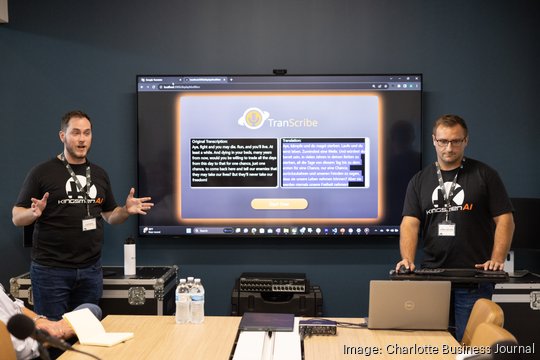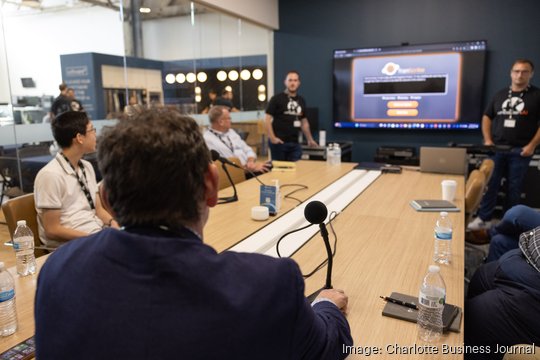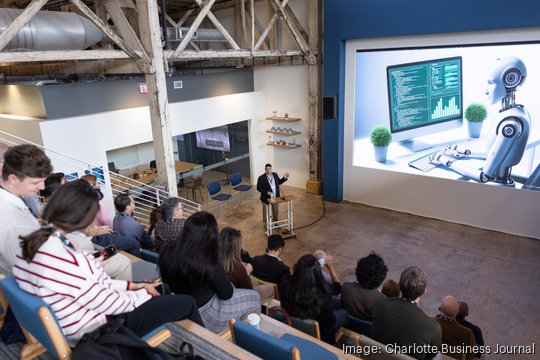The introduction of generative artificial intelligence can be traced back to the 1960s, but the recent popularity around the technology is driven by a new wave of AI tools such as ChatGPT and Google Bard.
With generative AI emerging as a promising technology trend for professionals, Charlotte-based Kingsmen Software hosted an AI expo at its Camp North End headquarters on Oct. 25 to discuss its opportunity and risk. Members of the company also demonstrated some of the tech's most in-demand capabilities.
What is generative artificial intelligence?
Generative AI creates content such as text, images, videos, data and 3D renderings based on immense amounts of data it's trained on.
"At the base of everything, it's just a ton of data," Bill Clerici, CEO of Kingsmen Software, said during a panel discussion at the expo. "It's so much data that it's hard to get your head around. It's getting better and better at this (content creation) to where we're even starting to look at it for taking down information and getting information out of images."
A demonstration at the event showed how to use the firm's KAI creator, which is its generative AI tool used for producing blogs, podcasts, marketing campaigns and videos, and images based on specific topics it's fed.
Another demo was of Kingsmen's transcribing tool, which can produce a text summary in various languages from a voice recording.
Clerici said generative AI is also an analytical machine, meaning it is an expert at recognizing patterns and understanding responses based on those patterns it has been given.
"And as you've probably seen working with ChatGPT, who invented the interface, it feels like you're having (a) conversation with a real person a lot of times," he said. "Why? Because it's got a large language model underneath it that understands what you're saying."
Clerici said perhaps most importantly, generative AI is an informed estimator, so it can excel at predicting the probability of what comes next.
What is generative AI not?
Generative AI is not a search engine, Clerici said. It can give some real historical data, but it's not as trustworthy as a traditional browser.
"If you're looking at ChatGPT and asking your questions and thinking it's going to give you the same type of stuff but (in) a better way than Google or Bing does — no, don't trust it," he said.
That's primarily because the technology is not producing pure facts. Generative AI models were not designed to have a memory besides the conversation it's being fed.
"It feels like it has memory, but at the end of the day, it's conversation based," he said. "So every time you ask ChatGPT something, it's sending everything that you previously said into the conversation so it knows it every single time."
There is a limit on how much data generative AI tools can receive, but Clerici said that could change in the future. The problem is that it can take millions of dollars to train a new generative AI model and require substantial time from people that create the tools and ensure its data is accurate, Clerici said.
What are some drawbacks of generative AI?
Several ethical concerns have surfaced with generative AI models, including its accuracy. There have been numerous cases of the tools providing incorrect information. The models are trained solely on data, and they're only as useful as the data provided.
Responses could incorporate bias in the content the tool has ingested, which is usually unknown if it occurs, Clerici said.
Another top concern is the security risks of generative AI, specifically stealing intellectual property, or the rights given to a person over their inventions.
Clerici said there could be a substantial amount of legal conversation on how concerns around AI and intellectual property will be handled.
"But at the end of the day, if these models are trained on all this data that's pulled from public information, how do you know what you're getting? Where you got it from? Did you create it?," he said. "And then we always know that regulation always comes with this stuff, and it's going to come. So you just have to be aware of that."
Clerici said that as businesses gain and learn about AI capabilities, it can be beneficial for efficient operations and tech employees.
"You can start coming up with business cases and start hooking these things together," Clerici said. "And this is exactly what we did. What's funny about this is we came up with this (AI expo) three or four months ago and now we're actually doing it. That's how fast stuff is changing. It's changing so fast that if we do this same expo in two months, all the demos may change completely."













